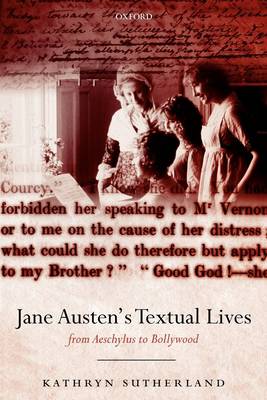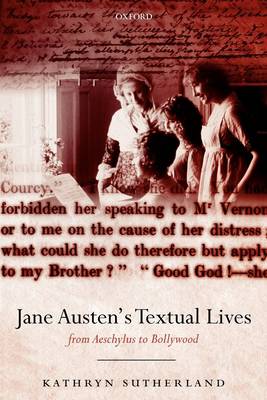
Bedankt voor het vertrouwen het afgelopen jaar! Om jou te bedanken bieden we GRATIS verzending (in België) aan op alles gedurende de hele maand januari.
- Afhalen na 1 uur in een winkel met voorraad
- Gratis thuislevering in België
- Ruim aanbod met 7 miljoen producten
Bedankt voor het vertrouwen het afgelopen jaar! Om jou te bedanken bieden we GRATIS verzending (in België) aan op alles gedurende de hele maand januari.
- Afhalen na 1 uur in een winkel met voorraad
- Gratis thuislevering in België
- Ruim aanbod met 7 miljoen producten
Zoeken
€ 93,45
+ 186 punten
Omschrijving
Through three intertwined histories Jane Austen's Textual Lives offers a new way of approaching and reading a very familiar author. One is a history of the transmission and transformation of Jane Austen through manuscripts, critical editions, biographies, and adaptations; a second provides a conspectus of the development of English Studies as a discipline in which the original and primary place of textual criticism is recovered; and a third reviews the role of Oxford University Press in shaping a canon of English texts in the twentieth century. Jane Austen can be discovered in all three.
Since her rise to celebrity status at the end of the nineteenth century, Jane Austen has occupied a position within English-speaking culture that is both popular and canonical, accessible and complexly inaccessible, fixed and certain yet wonderfully amenable to shifts of sensibility and cultural assumptions. The implied contradiction was represented in the early twentieth century by, on the one hand, the Austen family's continued management, censorship, and sentimental marketing of the sweet lady novelist of the Hampshire countryside; and on the other, by R. W. Chapman's 1923 Clarendon Press edition of the Novels of Jane Austen, which subjected her texts to the kind of scholarly probing reserved till then for classical Greek and Roman authors obscured by centuries of attrition. It was to be almost fifty years before the Clarendon Press considered it necessary to recalibrate the reputation of another popular English novelist in this way.
Beginning with specific encounters with three kinds of textual work and the problems, clues, or challenges to interpretation they continue to present, Kathryn Sutherland goes on to consider the absence of a satisfactory critical theory of biography that can help us address the partial life, and ends with a discussion of the screen adaptations through which the texts continue to live on. Throughout, Jane Austen's textual identities provide a means to explore the wider issue of what text is and to argue the importance of understanding textual space as itself a powerful agent established only by recourse to further interpretations and fictions.
Since her rise to celebrity status at the end of the nineteenth century, Jane Austen has occupied a position within English-speaking culture that is both popular and canonical, accessible and complexly inaccessible, fixed and certain yet wonderfully amenable to shifts of sensibility and cultural assumptions. The implied contradiction was represented in the early twentieth century by, on the one hand, the Austen family's continued management, censorship, and sentimental marketing of the sweet lady novelist of the Hampshire countryside; and on the other, by R. W. Chapman's 1923 Clarendon Press edition of the Novels of Jane Austen, which subjected her texts to the kind of scholarly probing reserved till then for classical Greek and Roman authors obscured by centuries of attrition. It was to be almost fifty years before the Clarendon Press considered it necessary to recalibrate the reputation of another popular English novelist in this way.
Beginning with specific encounters with three kinds of textual work and the problems, clues, or challenges to interpretation they continue to present, Kathryn Sutherland goes on to consider the absence of a satisfactory critical theory of biography that can help us address the partial life, and ends with a discussion of the screen adaptations through which the texts continue to live on. Throughout, Jane Austen's textual identities provide a means to explore the wider issue of what text is and to argue the importance of understanding textual space as itself a powerful agent established only by recourse to further interpretations and fictions.
Specificaties
Betrokkenen
- Auteur(s):
- Uitgeverij:
Inhoud
- Aantal bladzijden:
- 404
- Taal:
- Engels
Eigenschappen
- Productcode (EAN):
- 9780199234288
- Verschijningsdatum:
- 11/10/2007
- Uitvoering:
- Paperback
- Formaat:
- Trade paperback (VS)
- Afmetingen:
- 166 mm x 231 mm
- Gewicht:
- 598 g

Alleen bij Standaard Boekhandel
+ 186 punten op je klantenkaart van Standaard Boekhandel
Beoordelingen
We publiceren alleen reviews die voldoen aan de voorwaarden voor reviews. Bekijk onze voorwaarden voor reviews.












